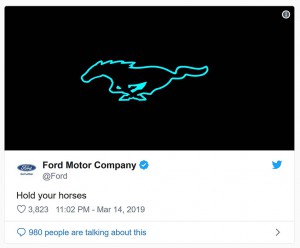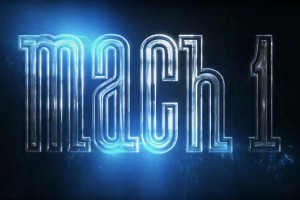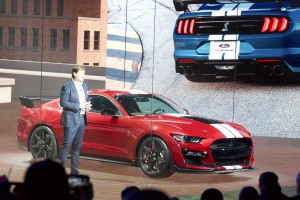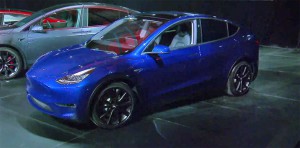 “Hold your horses,” or so said Ford Motor Co. in a tweet not-so-coincidentally timed to reach the social media world just as Tesla CEO Elon Musk was getting ready to debut his company’s new Model Y battery-electric SUV.
“Hold your horses,” or so said Ford Motor Co. in a tweet not-so-coincidentally timed to reach the social media world just as Tesla CEO Elon Musk was getting ready to debut his company’s new Model Y battery-electric SUV.
The Ford post featured that short blurb and a blue version of the Mustang logo against a black background, nothing more. But it does hint at several projects that Ford has already confirmed are in the works. That includes both a hybridized version of the pony car, as well as a Mustang-influenced all-electric SUV that Ford announced during the 2018 North American International Auto Show in Detroit.
An early player in the electrification field, Ford has fallen behind not just Tesla but conventional rivals like General Motors and Volkswagen, both investing heavily in long-range, battery-electric vehicles, or BEVs. Ford officials say they are going to make a push to catch up and have confirmed that the first entry into next-gen electric technology would be a performance-oriented crossover tentatively named Mach 1 and due to market about when the Tesla Model Y hits the street about a year from now.
“Getting the timing right” is one of the critical challenges for automakers moving into the still-small market for all-electric vehicles, Joe Hinrichs, Ford’s President of the Americas, told TheDetroitBureau.com last week.
But so is coming to the market with the right kind of battery-car.
(Click Here to learn what Ford said when it revealed the Mach 1 project last year.)
“Selling electrification on just fuel efficiency is not going to pay out when gas is going for $2.50 a gallon,” Ford Executive Vice President Hau Thai-Tang, said during a briefing at Detroit’s Cobo Hall convention center in January 2018.
An engineer by training Thai-Tang has been deeply involved in the Mustang program over the years and one of those looking for ways to retain the muscle car’s relevance while adapting it to both changing consumer demand as well as evolving government mileage and emissions mandates.
“Mustang will continue to evolve and strike the right balance between heritage and being contemporary and fitting into today’s society,” Corey Holter, the Ford Group Marketing Manager who oversees the muscle car, told TheDetroitBureau.com during an event celebrating Mustang’s 54th anniversary, last April.
(Click Here for our full coverage of the Tesla Model Y debut.)
Ford is just getting ready to roll out the most powerful factory-built version of the Mustang ever, the Shelby GT 500, which follows a relatively traditional path, using a massive supercharger to up the performance of its V-8 engine. But Mustang will offer a variety of different powertrain options going forward.
That becomes especially important as the Mustang – the only coupe that will still be sold by Ford in the U.S. – expands its presence in foreign markets like Europe and China. The Chinese market, in particular, is rapidly moving towards electrified propulsion in all its various forms, so “a hybrid Mustang will help further unlock Mustang’s potential in some of those markets,” Holter told TheDetroitBureau.com.
(Mustang cracks 700-hp barrier with debut of Shelby GT500. Click Here for more.)
Ford has been coy about its approach to electrifying the Mustang. It could use the technology simply as a way to boost mileage, much as it has done with other models. But sources suggest such a drivetrain would more likely be used to increase both fuel efficiency and performance. That’s a path a number of automakers are taking, including high-line brands like Aston Martin which showed off a hybrid-supercar, the AM RB 003, at the Geneva Motor Show earlier this month. Ferrari is also developing high-performance hybrids and Daimler’s Mercedes-AMG unit is moving in a similar direction.
As for going all-electric, Ford has not indicated a version of the Mustang itself would abandon the internal combustion engine entirely. What Jim Farley, President of Ford Global Markets, called “a whole new world…for our customers” appears to be a CUV with some “DNA” from the Mustang, whatever that might translate into.
The term, crossover, is a nebulous one covering a broad range of designs that, in some cases could just as easily be called tall sedans, wagons or hatchbacks, but the designation currently has more appeal to consumers. In the U.S., utility vehicles, in all their forms, account for more than half the market, with coupes and sedans continuing to lose momentum.
The Mach 1 codename has deep historical roots for Ford, harkening back to a performance version of the Mustang first introduced in 1968, as well as a company race program. Whether it would apply to the production crossover is far from certain.
What seems likely is that Ford wants to go head-to-head with the Model Y, and not just the basic version of Tesla’s new CUV but the high-performance model that CEO Elon Musk promised will be able to launch from 0 to 60 in just 3.5 seconds and hit a top speed of 150 mph.
The Mustang-based electric CUV will be just the first in a wave of all-electric cars to come. All told, Ford has announced plans to invest about $11 billion in battery-based propulsion. “Electrification is a really important part of our future.”



